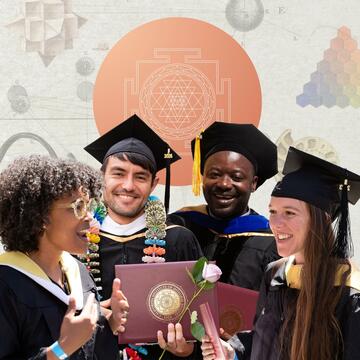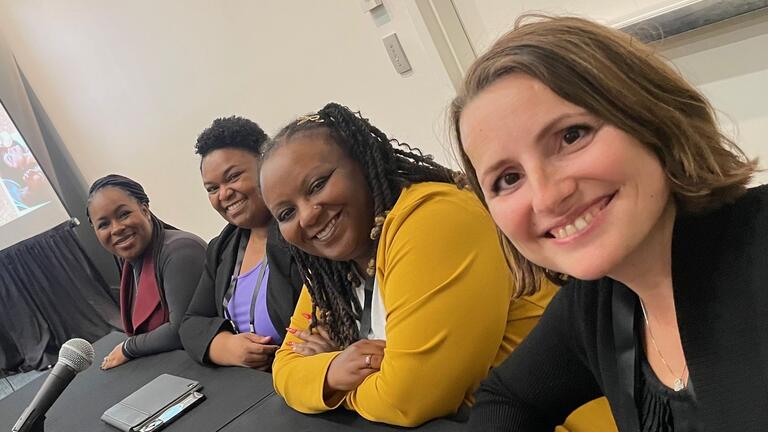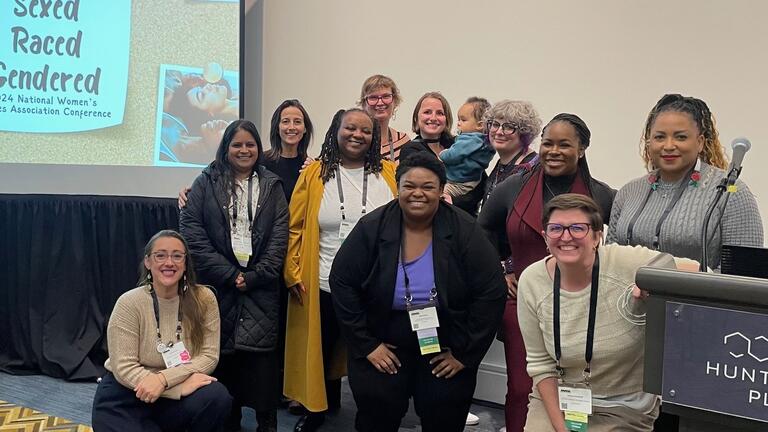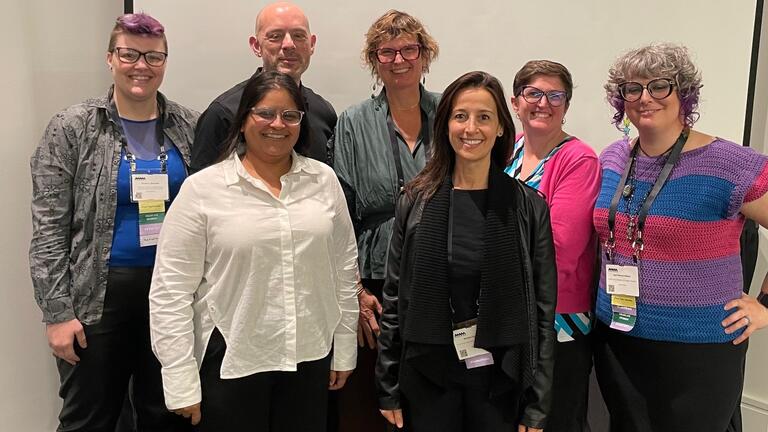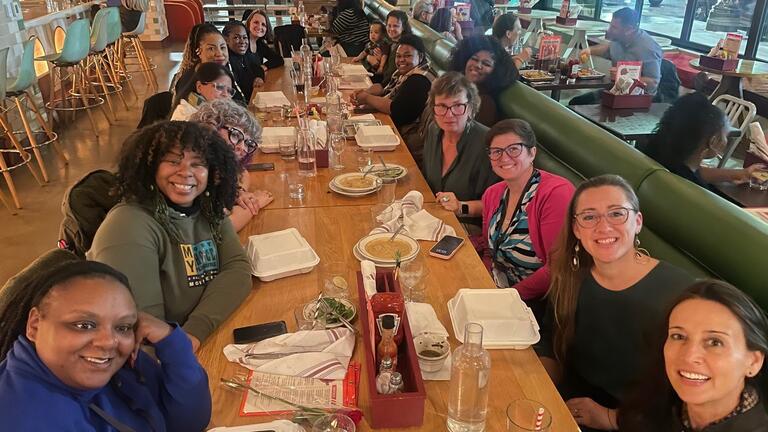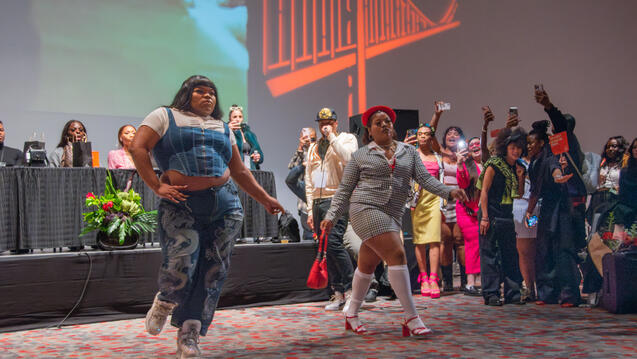Transformative Leadership alum Cynthia Huie, M.A. '24, brings creativity and connection to the San Francisco small-business community.
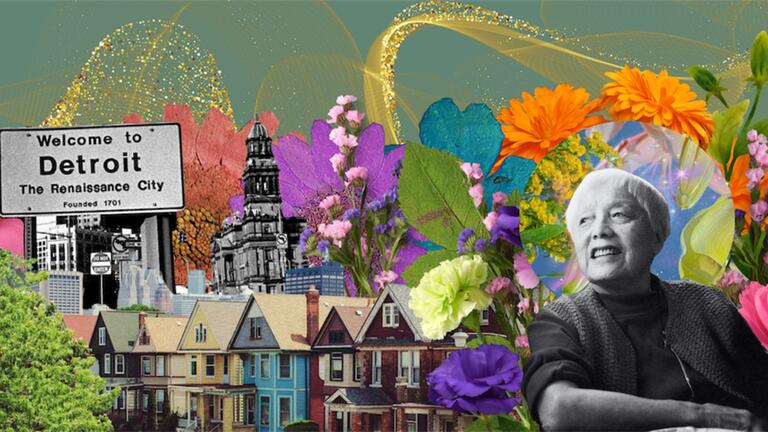
CIIS Doctoral Students Present at NWSA
Last fall, Human Sexuality doctoral students and faculty members presented two panels at the National Women's Studies Association (NWSA) meetings.
Last fall, nine Human Sexuality doctoral students and two faculty members attended the National Women's Studies Association (NWSA) meetings in Detroit. The meeting theme was "The Journey Not Only the Arrival," and the importance of critically rethinking feminist movements. The department planned two accepted panels — “Sexed-Raced-Gendered: Lived Realities of Intersectionality” and “Kinship and Body Transformations: Lived Realities of Intersectionality” — presented by Nijeria Jones, Malesha Griffin, Hadya Diallo, Colleen Schoenfeld, Natashia Fuksman, April Webber, Draven Alexander, and DDS Dobson-Smith. The department’s participation was suggested and spearheaded by Professor Katharina Azim and supported by Human Sexuality Department Chair and Professor Michelle Marzullo.
Speaking directly to NWSA’s 2024 call to center the journey that is often overshadowed by the arrival, the presenters explored creative, reflexive ways of resituating themselves as whole, complicated, relational scholars within sexuality studies. They drew from their rich and diverse backgrounds to make visible the integral connections that inform their emerging scholar identities. In neoliberal academia, the work of scholaring is often framed in terms of profit-rendering proficiency, efficiency, and standardization, and students are shaped into knowledge-producing degree-seekers (Morley, 2018). Students too rarely have the chance to slow down and question the complicated journey of their scholarly becoming, or to acknowledge all of their complicated, overlapping, dynamic identities within intersecting social, educational, and institutional spaces. Scholaring and meaning-making, however, do not solely occur in academic institutions but also through community and kinship (Collins, 2022).
The panels and conference presented a opportunity for the student presenters to critically examine how creative and self-reflective work can contribute to embodied, intersectional engagement with sexuality studies. They drew on feminist intersectional autoethnography (Johnson & LeMaster, 2020) to critically question the sex, race, and gender dimensions of their lived experiences and sexual identities and produce “writing animated by the everyday,” to quote feminist scholar Sara Ahmed (2017, 10).
Training reflexive social scientists in the U.S. is critical for fostering more inclusive, engaged, and socially responsible scholarship. The Human Sexuality doctoral program prioritizes the cultivation of scholars who deeply engage with their own positionalities, lived experiences, and ethical responsibilities. Reflexive scholars are uniquely able to challenge dominant epistemologies, disrupt hegemonic narratives, and create scholarship that is accountable to the communities it seeks to understand. In the field of sexuality studies, where personal and political are deeply intertwined, such reflexivity allows for more nuanced, contextually rich analyses that acknowledge the complexities of our many identities.
The NWSA panelists demonstrated the transformative potential of our reflexive methodologies and close training in shaping scholars who not only produce knowledge but participate in the ethical reimagining of academic inquiry itself. The conference was also a wonderful chance for our doctoral students to share their research and field questions from others in the field, attend panels and talks, and network with scholars of sex, sexuality, and gender from around the U.S. We are currently in the process of submitting work for the 2025 conference and hope that it will be an annual event for our students and faculty.
References
Ahmed, Sara. 2017. Living a Feminist Life. Duke University Press.
Collins, Patricia Hill. 2022. Black Feminist Thought (30th-anniversary edition). Routledge.
Johnson, Amber L., and Benny LeMaster. 2020. Gender Futurity, Intersectional Autoethnography. Routledge.
Morley, Louise. 2018. “Changing the Shape of Higher Education: Troubling Neoliberalism and Imagining Alternativity.” Plenary address at the Society for Research into Higher Education (SRHE) Conference, December 7.
Moments from CIIS at the 2024 NWSA Conference

Human Sexuality
Grounded, contextual engagement with current issues in sexuality to drive positive change
Related News
For the second year, CIIS’ Center for Black & Indigenous Praxis joined Generations, a celebration of Black LGBTQIA+ cultures in the Bay Area.
The Department of Women's Spirituality honors International Women's Day by challenging oppression, sharing wisdom, and fostering justice, liberation, and community healing.
